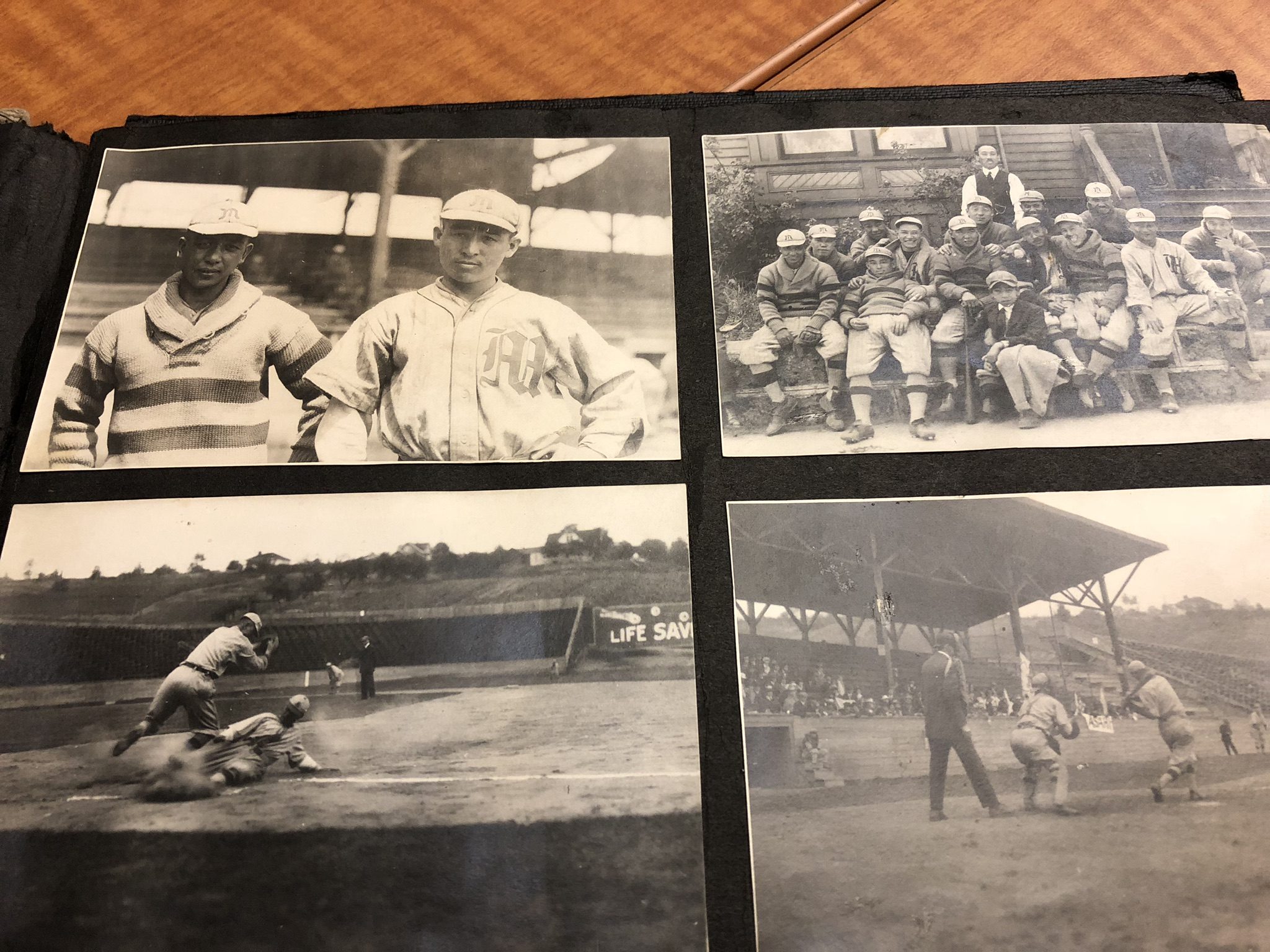By Jason Cruz
Northwest Asian Weekly

Photo album that Doug Tsujii discovered
Doug Tsujii played shortstop as a child for his little league baseball team. Little did he know that baseball skills ran in his blood — his grandfather also played the position for a Japanese Canadian baseball team. It was recently uncovered that Tsujii’s grandfather, “George” Sadakichi Iga, was part of a Japanese Canadian Asahi baseball club that was inducted into the Canadian Baseball Hall of Fame.
The Vancouver Asahi were honored at a dinner in June 2003, which enshrined them into the Canadian Baseball Hall of Fame and Museum. The team played from 1914 to 1941. Awards were given to the descendants of the players, but several of the team members and their families could not be located. One of these players was “George” Sadakichi Iga.
Fourteen years later, with the help of a descendent of one of the Japanese players in Japan and a Seattle University associate professor, Tsujii will receive the award on behalf of his grandfather. Only after an online search which led Yobun Shima, a family member of one of the Asahi, to come across an article written by Marie Wong, did the search for Iga pick up. Wong, an associate professor of Urban Planning and Asian American Studies, wrote an article about Seattle’s Japanese American Community baseball in 2013, and Shima sent an email asking if she could assist in finding Iga. Wong was interested in the mystery and provided her experience. She worked with Midori Okazaki of Puget Sound Regional Archives to learn more about George Iga.
“The first thing I did was contact some of the Japanese elders in the community.” Wong queried to many, “Does the name ‘Iga’ ring a bell?”
“When I didn’t have luck with that, I went through archival records.” Wong found a couple of records and just enough to do a search. “It was just a matter of tracing names to George Iga.” The dead ends related to the fact that they were looking for the Iga surname. However, Iga had three daughters who took the names of their husbands. Marriage records helped track down Tsujii, who was involved with the Nisei Veterans Committee Memorial Hall in the International District.
Tsujii recalled that his mother was very young when Iga passed away, which likely was the reason she never told her son about his grandfather. Tsujii noted that his aunt did not tell him about his grandfather’s sports past.
When Tsujii’s aunt passed away, he was tasked with cleaning up her home. While most of the possessions had to be thrown away or given to charity, he had kept several boxes. It turns out that those items included pictures and memorabilia from Iga’s baseball days. There was also a bat with Iga’s name engraved on it. Tsujii recognized the bat in his aunt’s home, just resting up against a wall in the home and decided to keep it instead of discarding it. Little did he know that the bat carried historical meaning.
When contacted by Wong about the award, Tsujii had no idea. “I was not aware that he was such a good baseball player.” Tsujii revisited the items he saved from his aunt’s home. He discovered an album of pictures in a box which included many of his grandfather in a baseball uniform. There were also pictures of his grandfather playing an instrument. Prior to the pictures, he did not know much about his grandfather’s playing days. “It’s great to know about this. I wish I would have known about this when clearing out [my aunt’s] home,” he said. “I would have been more mindful in finding more information about him.” The album also offered up pictures of his grandfather as a youth.
Jason Beck, the curator of the BC Hall of Fame indicated that he was working with Tsujii about delivering a medal that the Asahi received when they were inducted in 2003.
The Asahi were formed in 1914 and was a league of Issei and Nisei Canadians, who helped bridge the prejudice and discrimination that was directed toward the Japanese. The team played a brand of baseball based on fundamentals, such as executing bunts and stealing bases. For this play, their style was known as “brain ball.”
The Asahi won the Pacific Northwest Championship five years in a row, from 1937 to 1941. But in 1942, the Canadian government interned all people of Japanese descent. While they took baseball to the internment camps, the Asahi never played together as a team again.
Iga married and lived in Seattle. During his time with the Asahi, he took a train between Seattle and Vancouver to play games and was one of the players selected to play in Japan. Iga died in 1935, prior to World War II, which tore the team apart.
“It is one of the more gratifying exercises I’ve ever been involved with after such a long period of time,” Wong said of her role in helping connect the dots to finding Iga and unveil an interesting past his descendants never knew. “It took 103 years, three countries, and a number of people to see that this medal reached its home.”
Jason can be reached at info@nwasianweekly.com.



